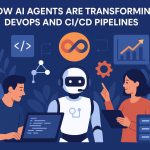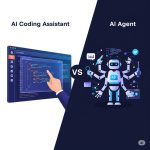Last Updated on August 23, 2025 by Darsh
The software development landscape is undergoing a profound transformation. What was once a largely manual and iterative process is rapidly evolving, driven by the increasing sophistication of Artificial Intelligence. In 2025, AI agents are not merely tools; they are becoming integral members of development teams, capable of autonomous action, learning, and collaboration. This guide will explore the multifaceted impact of AI agents on software development, offering a comprehensive look at their capabilities, benefits, challenges, and the exciting future they herald.
The Rise of Autonomous AI Agents in Software Development
For years, AI in software development largely meant intelligent assistants or code generators that augmented human efforts. Think of tools that suggest code snippets or identify minor errors. While valuable, these were reactive, requiring constant human prompting. The shift we’re witnessing in 2025 is towards AI agents – autonomous entities that can perceive their environment, reason, make decisions, and act to achieve complex, predefined goals.
This isn’t about AI replacing developers entirely, but rather about a fundamental redefinition of roles and workflows. AI agents are taking on end-to-end responsibilities, from designing data models and building APIs to setting up backends and deploying complete applications. This level of autonomy is rewriting the development cycle, leading to significantly decreased deployment times and a focus on innovation rather than tedious, repetitive tasks.
What Defines an AI Agent in Software Development?
AI agents are more than just smart scripts. They possess several key characteristics that distinguish them:
- Autonomy: They can operate independently, making decisions and executing tasks without constant human intervention.
- Goal-Oriented: They are designed to achieve specific objectives, whether it’s generating a new feature or debugging an entire module.
- Perception: They can gather and process information from their environment, understanding context and changes.
- Reasoning and Decision-Making: They employ algorithms to determine the best course of action based on their understanding and programmed goals.
- Learning and Adaptation: Many advanced agents can learn from experience, refine their performance, and adapt to new situations over time.
- Tool Use: They can integrate with and utilize various software tools, APIs, and platforms to achieve their objectives.
This combination of capabilities allows AI agents to tackle complex, multi-step actions, transforming how software is built, maintained, and delivered.
The Transformative Impact on the SDLC
The Software Development Life Cycle (SDLC) is experiencing a revolution across all its phases due to the integration of AI agents. From initial planning to ongoing maintenance, AI is boosting efficiency, quality, and speed.
Requirement Gathering & Analysis
Traditionally, this phase is highly manual and prone to misinterpretations. AI agents can significantly streamline it. They can analyze large volumes of existing documentation, user feedback, and market trends to identify requirements, pinpoint dependencies, and even generate preliminary project plans. This accelerates the initial stages and helps ensure a clearer understanding of project scope.
Planning & Design
AI agents are proving invaluable in the planning and design phases. They can use predictive analytics to estimate project timelines, resource requirements, and potential risks with greater accuracy. For design, generative AI is revolutionizing wireframing and UI/UX prototyping, automating the creation of design elements and accelerating the prototyping process. This means designers can iterate faster and explore more possibilities.
Development & Coding
This is perhaps where the impact of AI agents is most visible. AI agents are automating repetitive coding tasks, generating boilerplate code, and even scaffolding entire projects. Tools like GitHub Copilot, a pioneer in AI coding assistance, offer real-time code suggestions and auto-completion, drastically increasing developer productivity. More advanced agents like Devin AI can autonomously write, debug, and deploy code.
This doesn’t mean developers are obsolete. Instead, they are freed from mundane coding, allowing them to focus on higher-level logic, complex problem-solving, and innovative solutions. AI agents are transforming the role of developers, making them more strategic and creative.
Testing & Quality Assurance
AI agents are fundamentally changing how software is tested. They can automatically generate comprehensive test cases based on application behavior, historical data, and user interactions. This significantly increases test coverage and reduces manual effort. AI-powered tools can also perform real-time code analysis, identify potential bugs and vulnerabilities, and even suggest fixes.
Furthermore, AI agents facilitate “shift-left” testing by providing real-time feedback on potential defects earlier in the development lifecycle. They can monitor application performance, detect security vulnerabilities, and even self-heal broken test cases by adapting to UI or API changes. For more insights on AI in testing, you can explore resources on dtechunt.com regarding AI-powered testing tools.
Deployment & Operations (DevOps)
The integration of AI agents extends seamlessly into DevOps. They can automate deployment processes, monitor infrastructure in real-time, and predict potential failures before they occur. AI agents can optimize resource allocation in cloud environments, ensuring efficient use of computing resources and potentially reducing hosting costs. They streamline CI/CD pipelines, making deployments faster, more reliable, and more automated.
Maintenance & Support
Post-deployment, AI agents continue to add value. They can continuously monitor applications for performance issues, security vulnerabilities, and user experience anomalies. They can automate routine maintenance tasks, such as applying patches or updating configurations. For support, AI-driven chatbots and virtual assistants can provide immediate assistance, resolve common issues, and answer user queries, reducing the burden on human support teams.
Key Benefits of Integrating AI Agents
The widespread adoption of AI agents in software development is driven by a compelling set of benefits:
- Increased Efficiency and Productivity: AI agents automate repetitive, time-consuming tasks, freeing up developers to focus on higher-value activities. This leads to faster development cycles and quicker time-to-market.
- Enhanced Code Quality: AI tools can identify errors, vulnerabilities, and inefficiencies early in the development process, leading to more robust, secure, and maintainable codebases. They can enforce coding standards and suggest best practices.
- Faster Prototyping and Deployment: The ability of AI agents to generate code, designs, and automate deployment processes significantly accelerates the entire development pipeline.
- Cost Reduction: By automating tasks, reducing bugs, and optimizing resource allocation, AI agents contribute to significant cost savings for organizations. They minimize rework and improve operational efficiency.
- Improved Decision-Making: AI agents can analyze vast amounts of data, providing insights into project risks, resource bottlenecks, and potential delays. This data-driven approach leads to better-informed decisions.
- Scalability: AI agents can be scaled to handle increasing operational needs without the significant costs and time associated with scaling human resources.
- Continuous Learning and Adaptation: Advanced AI agents can learn from past experiences and continuously improve their performance, making them more effective over time.
Challenges and Considerations
While the benefits are significant, the integration of AI agents is not without its challenges. Addressing these is crucial for successful adoption.
- Data Quality and Availability: AI agents are only as good as the data they are trained on. Poor data quality, biases in training data, or a lack of relevant data can lead to unreliable or unfair outcomes.
- Complexity of Integration: Integrating AI agents into existing complex software development environments can be challenging, requiring robust APIs and seamless workflows.
- Ethical and Safety Considerations: Ensuring transparency, accountability, and fairness in AI agent decision-making is paramount. Questions of ownership, intellectual property, and potential misuse of AI-generated code need careful consideration. Organizations must establish clear ethical frameworks.
- Continuous Learning and Maintenance: AI agents are not “set it and forget it” solutions. They require continuous monitoring, retraining, and updates to maintain their effectiveness and adapt to evolving requirements.
- Security Risks: Autonomous AI systems can be vulnerable to attacks, leading to data breaches or malicious code generation. Robust security measures are essential.
- Over-reliance and Loss of Human Expertise: There’s a risk of developers becoming overly reliant on AI agents, potentially leading to a decline in fundamental coding skills or a lack of critical thinking. A balanced approach, where AI augments human capabilities, is vital.
The Future Landscape: 2025 and Beyond
Looking ahead to 2025 and beyond, AI agents are poised to become even more sophisticated and integrated into the fabric of software development.
Multi-Agent Systems and Collaboration
We will see an increase in multi-agent systems, where specialized AI agents collaborate to achieve larger, more complex development goals. One agent might handle backend logic, another frontend design, and a third, testing and deployment, all working in concert. This collaborative AI environment will further accelerate development speed and efficiency.
Hyper-Personalization and Adaptive Development
AI agents will become more adept at understanding individual developer preferences, project contexts, and user needs, offering highly personalized suggestions and adapting workflows in real-time. This will lead to more intuitive and tailored development experiences.
AI-Driven Project Management
AI agents are already making inroads into project management. In 2025, they will become even more sophisticated, capable of automating task allocation, tracking progress in real-time, predicting project risks with higher accuracy, and optimizing resource allocation across multiple projects. Tools like Corexta and Trello AI are already demonstrating these capabilities. For more information, you can check out dtechunt.com’s articles on AI for project management.
No-Code/Low-Code Platforms Enhanced by AI Agents
The rise of no-code and low-code platforms will be significantly amplified by AI agents. These agents will make it even easier for non-developers to create complex applications by translating natural language commands into functional code and automating intricate workflows. This will democratize software creation.
Ethical AI and Explainability
As AI agents take on more critical roles, the focus on ethical AI development and explainability will intensify. Developers and organizations will need to ensure that AI agents operate transparently, their decisions are explainable, and biases are mitigated. This will involve implementing robust auditing tools and establishing clear governance structures.
Practical Steps for Adopting AI Agents
For organizations looking to leverage the power of AI agents in their software development, here are some practical steps:
- Start Small and Iterate: Begin by automating specific, repetitive tasks with AI agents before attempting large-scale overhauls. This allows for learning and refinement.
- Invest in Data Infrastructure: Ensure high-quality, well-structured data is available to train and feed your AI agents. Data is the fuel for effective AI.
- Upskill Your Workforce: Train your developers to work with AI agents, understanding their capabilities and how to effectively collaborate with them. The role of the developer is evolving, not disappearing.
- Prioritize Ethical Considerations: Establish clear ethical guidelines and frameworks for AI agent deployment. Regularly audit their performance for bias and fairness.
- Choose the Right Tools: Research and select AI agent platforms and tools that align with your specific needs and existing tech stack. Some popular options include Devin AI, GitHub Copilot, LangChain, and Autogen. (You can find comparisons and reviews of these tools on platforms like dtechunt.com).
- Foster a Culture of Experimentation: Encourage your teams to experiment with AI agents and discover new ways to integrate them into their workflows.
Conclusion
AI agents are not a futuristic concept; they are a present-day reality rapidly reshaping software development. In 2025, their ability to automate, learn, and collaborate is driving unprecedented levels of efficiency, quality, and innovation. While challenges exist, particularly around data, ethics, and integration, the benefits far outweigh the hurdles. By embracing AI agents strategically, organizations can unlock new levels of productivity, empower their developers, and deliver exceptional software solutions faster than ever before. The future of software development is not just automated; it is intelligently, autonomously, and collaboratively built by humans and AI agents working in harmony.
For more in-depth insights into the latest trends and tools in AI for software development, be sure to visit dtechunt.com.



